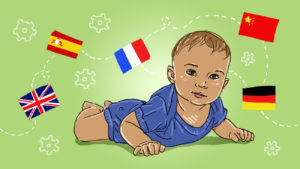6 Benefits of Raising a Bilingual Child
There are many benefits to raising a bilingual child. This video highlights six critical benefits that your child will receive from being exposed to a bilingual education early in life.
- Children Learn Language Without an Accent: Neither my husband or myself speak any level of Mandarin. One of the best compliments that we receive when native Mandarin speakers communicate with our children is “their accent is perfect.” Our daughters truly love speaking Mandarin and despite our household’s fluency in the language the fact that our daughters were introduced to Mandarin at such an early age native speakers continuously acknowledge that their Mandarin is void of any English accent that is often found in native English speakers learning Mandarin.
- Language Exposes Children to Different Cultures: I have to admit that sometimes this is a mixed bag as it relates to raising bilingual Mandarin speakers as an African American family. There are so many connections between the Chinese and African American community. But the Chinese culture has an open door policy around criticism and accountability that is very different than the “American way” of parenting. On one occasion a Mandarin speaking parent shared that a teacher informed a kindergartner “if you don’t pick up your back pack off the floor I will never be your friend again.” The native English speaking parents were shocked and offended by the comment. The parents that were raised by Chinese speaking parents laughed it off stating “that sounds just like my mom.” We have struggled with the fact that our children are exposed to a level of engagement that we view as harsh and at times inappropriate. I have had many discussions with Black parents that are deeply troubled with this level of engagement. We have not identified that our children have internalized any negative issues regarding self-image regarding these statements and continue to move forward. Additionally, the Chinese culture is deeply embedded with fables and folklore surrounding the Monkey King and stories that are inclusive of subtle issues around skin complexion, stereotypical gender roles and death and dying. We have embraced this process to discuss the parallel process in American and African American history but many families are unable to connect with these fables and cultural depictions. The novel Sugar by Jewell Parker Rhodes is an example of the literature that we expose our daughters to in order to explore a shared and parallel experience between the Chinese American and African American experience.
- Children Learn Through Play: Our daughters have been completely immersed in the Chinese language experience because we have had a series of excellent teachers. Initially, our daughters were in a preschool that provided a 100% Mandarin Immersion experience where the entire classroom instruction was in Mandarin – from drop off at 8am until pick up at 6pm. The teachers have been so kind, caring and nurturing that our daughters’ experience, engagement and introduction to the language was enjoyed with an incredible amount of fun that made it easy to digest. They are currently in a program that is 50% Mandarin and 50% English. The girls continue to enjoy the hands on activities that assist them in learning a new language and exploring the world around them.
- Caretakers Who Speak a Foreign Language: Due to cost and accessibility this is not always an available option to monolingual parents. We have been lucky that we live in Berkeley and that there is a large community of Mandarin speakers at the local university. While we do have to pay more for college student babysitters that are Mandarin speakers than we do for our English speaking sitters it has been a great opportunity for our children. Additionally, we have noticed that the Mandarin speaking sitters have truly enjoyed the relationship that they have developed with our children. They have consistently been impressed with our daughters’ language skills and enjoy the opportunity to further their contact with Mandarin speakers in the US. Bringing native speakers into the home has also encouraged the girls to speak more Mandarin with each other outside of school. I have noticed that when the girls are about to get in trouble – yelling at each other or refusing to share – they have opted to speak to one another in Mandarin in an effort to avoid mommies consequences. Albeit it is funny I find ways to encourage engaging in Mandarin at home without using it to share secrets from mommy!
- Children Learn When They Are Emotionally Engaged: Our daughters also benefit from their language learning experience through their exposure to PAASSC (Parents of African American Students Studying Chinese). For the first few years we never explicitly explained to our girls what PAASSC was. But the connection to other African American students provided them with an opportunity to consistently engage with a larger community of sutdents of African descent that are also learning Chinese. While my daughters were young I believe that they thought most Black children spoke Chinese because such a significant amount of non-relatives that they were meeting also spoke Chinese. This was a great way to normalize their process and help them to feel confident in their skills and experience as a bilingual youth being raised in a monolingual household.
- Learn At Home with Language DVDs and CDs: We have two amazing Chinatown communities available to us here in the Bay Area (San Francisco & Oakland). There is a plethora of DVDs that we have been able to purchase for our daughters (some that we like more than others). Additionally, we have enjoyed the range of videos available on YesAsia.com. We will be purchasing a Universal DVD player in the near future to obtain a larger selection of Mandarin films.
Monolingual parents do not have to miss out on the opportunity to raise bilingual children. There are many resources to help monolingual families raise bilingual children that love and grow from the experience – no matter how foreign it may feel to us.

 Previous Post
Previous Post Next Post
Next Post




